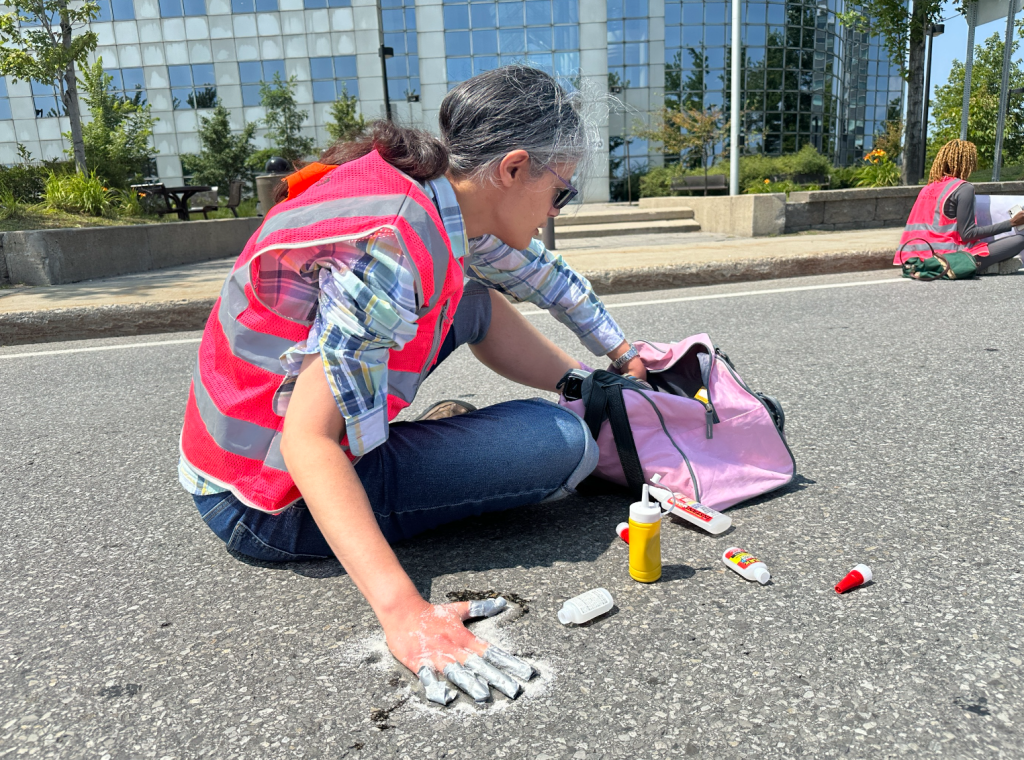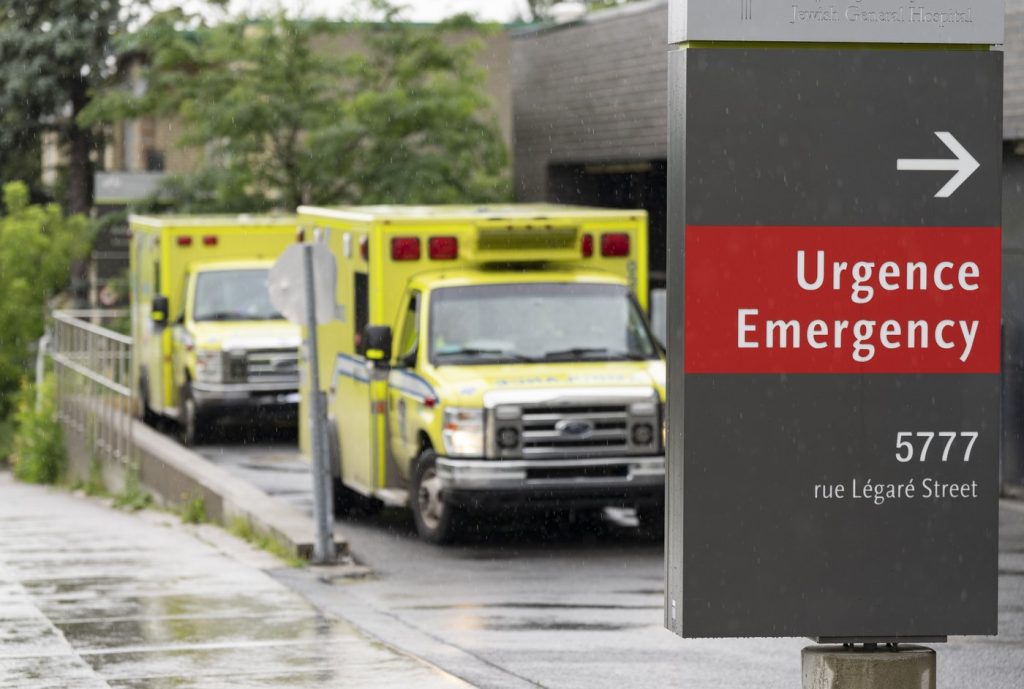Quebec public health: 10 measles cases, mainly in Montreal
Posted March 4, 2024 10:22 am.
Last Updated March 4, 2024 6:35 pm.
Quebec public health director Dr. Luc Boileau says measles virus is circulating in the province, about 10 cases, with the majority in Montreal (seven at least, with 14 locations for exposure) and a few in Laval and the Montérégie. And he’s urging people to make sure their vaccinations are up to date – a two-dose vaccine.
“Three of these cases were directly linked to travel,’ said Dr. Boileau on Monday in Montreal at a press conference. Adding that the others have come from community spread – which he called concerning. Measles can lead to serious illness and be fatal in some cases.
“Solutions exist, the vaccine,” said Dr. Boileau. Be vigilant he explained and get protected.
The return of measles can be explained by a lower vaccination rate which as fallen below the 95 per cent threshold, which is the minimum immunity guarantee for Quebecers. The measles vaccine is covered by Quebec’s immunization program. Public Health wants to see every region reach a 95 per cent vaccination rate.
Measles was previously eradicated in Canada through vaccinations, but it’s quietly spreading again and last week the provincial Ministry of Health and Social Services revealed.
“We’re worried about the fact that there’s a lot of Quebecers that are presently out of the country and that they might visit countries where the measles will circulate more than here, which is the case in most of the countries in Europe and even in the United States there are some outbreaks out down there in Florida. So we’re worried about the next week’s situation.”
Dr. Mylène Drouin, Montreal’s Public Health Director, and Dr. Caroline Quach-Thanh, a pediatrician, microbiologist-infectious disease specialist at CHU Sainte-Justine and Université de Montréal professor joined Dr. Boileau for Monday’s press conference.
Pregnant women, children, and those who are immunocompromised are most at risk, said Dr. Drouin. Montreal Public Health will also launch vaccination operations for daycares, schools, and others for those who are not adequately vaccinated.
“Check if your children are adequately vaccinated,” added Dr. Drouin. “Check the list of exposure sites, in case you were exposed. If you have symptoms like high fever, leaky nose, red eyes, a rash, isolate yourself and consult your doctor.”
About 80 per cent of Montreal children in elementary and high schools have been vaccinated against measles.
“We’re planning with the local health authorities to go in school for special operations, but specifically schools with low coverage, so we’ll have specific intervention after the March break and the other thing is going to be done in the province of Quebec – but mainly in Montreal also. We’re going to call people that are not adequately vaccinated because we are able to we have a register.”
If you were at the emergency room of Saint-Justine Hospital Feb. 25 to 29 or the Montreal Children’s Feb. 24 and 26 – it’s possible you or your child may have been exposed to measles, Dr. Boileau said. Adding that officials there have been tracing who may have been there, but reminding people to check for any possible symptoms.
Dr. Caroline Quach-Thanh said some children have been hospitalized with measles, but the cases are not extremely serious. Most are hospitalized for two or three days. There is no treatment specifically, not anti-viral that can be administered.
“We hadn’t see transmission [of measles] in the province of Quebec since 2019,” said Dr. Quach-Thanh.
Measles is highly contagious, the virus can remain active and contagious for up to two hours in a room even after an infected person has left, and it has a long incubation period — usually between 10 and 14 days. Its symptoms include fever, cough and a bumpy, red rash.
Common complications are ear infections and diarrhea. In rare cases, measles can be fatal.
“When vaccination rates are high, even if a few people do get sick, the virus doesn’t tend to spread,” said epidemiologist and cardiologist, Dr. Christopher Labos. “The big worry this time around is if we have enough unvaccinated people out there, the virus could start spreading and be continuously present in our society, so rather than having isolated outbreaks as we’ve had in the past, what we would have is continuous measles infections pretty much the same way we had 20, 30 years ago.”
Dr. Labos says if you had measles in the past or two doses of the vaccine, you are likely going to be immune for the rest of your life.
“The people who are at risk are people who never got vaccinated or who only got a single dose and who never caught measles before,” he said. “The most important thing is to get that second dose and to get it as early as possible so that children are protected, especially when they get into schools, which with measles at least does tend to be a very significant vector for spread of the virus.”
Laval measles cases
Laval Public Health last week said they’re doing contact tracing at the locations frequented by an infected person, with the specific locations being:
- École internationale des Aventuriers in Laval from Feb. 19 to Feb. 20.
- The Couche-Tard at 800 Chomedey Blvd., in Laval from Feb. 19 to Feb. 20. The person was there for 10 minutes sometime between 4:30 p.m. and 5:30 p.m.
- The waiting room at the Centre Médical Mieux-Être on Henri Bourassa Boulevard on Feb. 25. The person was there between 2:30 p.m. and 5:30 p.m.
- The second floor of the CHU Sainte-Justine Hospital on Feb. 21 between 6 p.m. and 7:30 p.m.
- The emergency room of that same hospital on Feb. 26 between 3 p.m. and 10 p.m.
Canada’s Chief Public Health Officer, Dr. Theresa Tam, issued a warning late February in a statement about the rising cases.
“Although measles has been eliminated in Canada, cases can still occur here when an individual who is not fully vaccinated has travelled to or from a country where measles is circulating,” she wrote. “Imported cases can lead to subsequent spread of measles in Canada among unvaccinated or under-vaccinated people. As of Feb. 23, 2024, we are aware of six measles cases in Canada, some of whom have required hospitalization.”
Additionally, The World Health Organization (WHO) reports that more than 306,000 cases of measles were documented worldwide in 2023 which is an increase of 79 per cent compared to 2022.
Cases can increase quickly if we’re not careful: Dr. Boileau
“If you’re coming back from a vacation, monitor your symptoms,” said Dr. Drouin, as Quebec is amid it’s Spring Break for many schools and travel is higher at this time of year.”
Ten cases isn’t many Dr. Boileau said, but this is how things start, and if we’re not careful, it can go up very fast. Exposing those who are young, immunocompromised, and others, can be dangerous.
One case can infect 16 people, added Dr. Caroline Quach-Thanh. “The minute you see local transmission, there is already concern there. It means that we haven’t been able to contain it with our 95 per cent population protection and so we’re really aiming to stop it at 10. If we stop at 10, we’ll be very happy.”
“If your child is more than 12 months and has not been vaccinated for measles, it’s time,” said Dr. Boileau.
For a vaccination appointment, head to Clic Santé.



